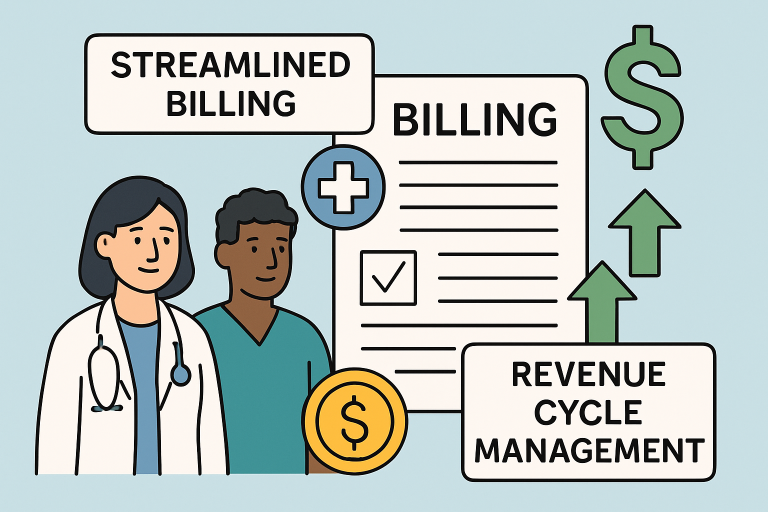Key Takeaways
- Automation and AI streamline the administrative aspects of RCM, boosting efficiency and accuracy.
- Clear patient financial engagement drives payment compliance and satisfaction.
- Proactive denial management protects revenue and accelerates payments.
- Integrated telehealth billing supports accurate reimbursement for remote services.
- Outsourcing RCM functions frees staff to focus on patient care while maintaining financial stability.
Introduction
Effective revenue cycle management (RCM) is foundational for the financial sustainability of healthcare organizations. It helps streamline operations, mitigate errors, and bolster patient satisfaction. By leveraging proven strategies and partnering with a trusted resupply company, providers can optimize billing workflows, reduce administrative burden, and drive reliable cash flow.
Today’s healthcare landscape demands that organizations improve internal efficiencies and embrace technology and patient-centric approaches. Smart RCM practices empower healthcare providers to stay competitive and ensure compliance, ultimately supporting better care outcomes and organizational health.
Embrace Automation and Artificial Intelligence
Healthcare RCM can be revolutionized by integrating automation and artificial intelligence (AI) into core processes. AI-driven technologies enable organizations to automate claims submissions, flag documentation anomalies, and optimize reimbursement cycles. Tools like robotic process automation handle repetitive administrative workloads, from insurance eligibility verification to coding compliance checks. This slashes human error and boosts speed, helping organizations receive payments faster while allowing staff to concentrate on more meaningful patient-facing tasks. As adoption grows, industry resources such as Becker’s Hospital Review highlight significant cost reductions and operational benefits through digital transformation.
Enhance Patient Financial Engagement
Modern patients are active healthcare consumers, expecting upfront clarity about their financial responsibilities. Clear, concise, and itemized bills help reduce confusion and increase trust. Implementing real-time cost estimation tools, digital payment portals, and adaptable payment plans makes it easier for patients to pay their bills, reducing payment lag and improving the overall experience. Innovations such as self-service kiosks and text-based payment reminders encourage prompt responses, minimizing outstanding balances.
Implement Proactive Denial Management
Reactive denial management can drain resources and impact cash flow. A forward-looking strategy utilizes predictive analytics to flag claims that may be denied based on historical data and payer trends. By identifying common denial reasons—such as incomplete documentation or eligibility issues—before claims reach insurers, healthcare organizations pre-empt payment delays and minimize revenue leakage. Ongoing staff training and automated system audits are vital to avoiding recurring matters and increasing the number of clean claims on first submission.
Integrate Telehealth Billing
Robust billing systems are essential because telehealth services are now integral to many practices. Telehealth reimbursement can be complex due to varying payer requirements and coding conventions. Ensuring continuous staff education on evolving telehealth billing guidelines and updating system logic to capture virtual care encounters helps safeguard revenue streams. Integrated solutions support error-free submission and ensure compliance with the latest telemedicine billing practices.
Consider Outsourcing RCM Functions
For many healthcare organizations, outsourcing RCM tasks—such as coding, billing, and collections—offers notable advantages. Specialized RCM vendors have cutting-edge tools and compliance expertise, driving increased claim acceptance rates and faster collections. Outsourcing allows internal teams to redirect focus toward improved patient care, quality initiatives, and core organizational goals, reducing the administrative workload and the cost associated with maintaining large in-house billing departments. According to Becker’s Hospital Review, outsourcing RCM functions has gained momentum as healthcare finance shifts toward value-based care and operational efficiency.
Leverage Data Analytics for Financial Forecasting
Data analytics enhances RCM by enabling accurate financial forecasting and risk mitigation. Predictive models help anticipate cash flow fluctuations and payment bottlenecks by examining historical claims data and patient payment patterns. These insights support better decision-making, allowing organizations to tailor collection strategies and proactively assist patients facing financial challenges with customized plans or early interventions. Data-driven forecasting also uncovers new revenue opportunities, driving continuous performance improvement.

Ensure Regulatory Compliance and Price Transparency
Healthcare regulations—including the No Surprises Act—demand transparent, patient-friendly billing and cost disclosures. Providers must invest in compliance management tools that adapt to ongoing policy changes and automate reporting. Maintaining current pricing information and ensuring it is readily accessible helps meet legal requirements and nurtures patient trust. Failing to comply risks financial penalties and damage to the organization’s reputation, underscoring the importance of continuous compliance monitoring and proactive policy alignment.
Foster a Patient-Centric Revenue Cycle
Making RCM patient-centered involves tailoring communication, billing, and support options to individual needs. Clear billing statements, flexible payment alternatives, and responsive customer service are critical for improving patient satisfaction while protecting revenue. This approach reduces confusion, limits disputes, and fosters long-term loyalty, as patients recognize the transparency and care demonstrated throughout the billing process.
Implementing these innovative revenue cycle management strategies helps healthcare organizations navigate an ever-evolving landscape, optimize finances, and deliver superior patient care, laying the groundwork for future success.
The Editorial Team at Healthcare Business Today is made up of experienced healthcare writers and editors, led by managing editor Daniel Casciato, who has over 25 years of experience in healthcare journalism. Since 1998, our team has delivered trusted, high-quality health and wellness content across numerous platforms.
Disclaimer: The content on this site is for general informational purposes only and is not intended as medical, legal, or financial advice. No content published here should be construed as a substitute for professional advice, diagnosis, or treatment. Always consult with a qualified healthcare or legal professional regarding your specific needs.
See our full disclaimer for more details.







